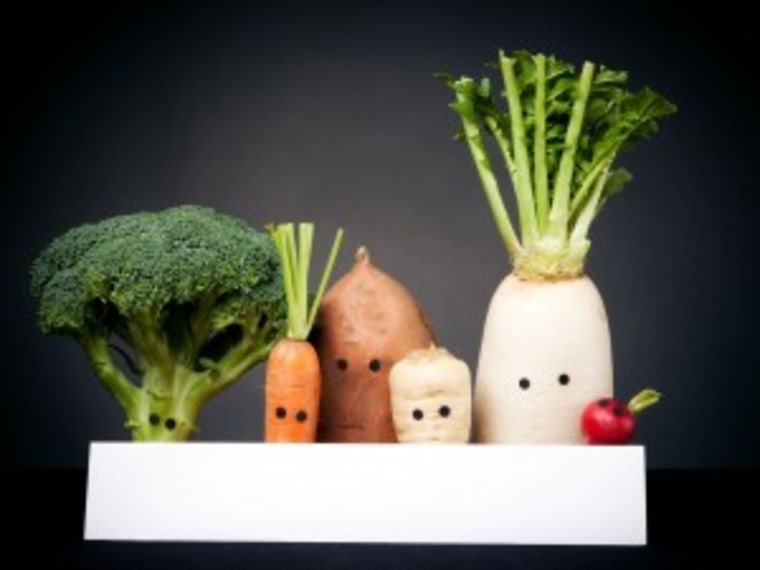First, the bad news: Up to 30 percent of all cancers are linked to poor diet. Now the very good news: Food can be powerful medicine in the fight against cancer, including breast cancer. Following a low-fat diet is key, since studies link a high-fat diet to more aggressive forms of breast cancer. Eating at least five servings of fruits and vegetables a day will also promote breast health. Which foods are best? We spoke to Amy Jamieson-Petonic, MEd, a registered dietitian and the director of wellness coaching at the Cleveland Clinic, to find out the top breast cancer–fighting foods. Add some of these nutritious, delicious foods to your diet to reduce your risk.
Broccoli
Number one on the list is broccoli, says Jamieson-Petonic. “It’s a real superfood when it comes to breast health,” she says. Broccoli’s isothiocyanates are the cancer fighters here, with the ability to break down breast cancer cells — specifically activating some genes that fight cancer and switching off others that fuel tumors. Other cruciferous vegetables prevent other cancers, but broccoli and broccoli sprouts are the key to breast cancer prevention because they have the greatest amount of isothiocyanates.
Beta-Carotene-Loaded Foods
“Too little beta-carotene has been linked to a higher risk of breast cancer,” explains Jamieson-Petonic. Dietary antioxidants like carotenoids (beta-carotene is one) can neutralize free radicals (those damaging cells in your body), absorbing their negative energy and rendering them harmless. Choose from carrots, pumpkin, apricots and other bright orange fruits and vegetables. To maximize the availability of the carotenoids in these foods, try to eat them raw or lightly steamed.
Mushrooms
Eating a daily portion of mushrooms could cut the risk of breast cancer by up to two-thirds, according to research reported in the International Journal of Cancer. Scientists found that women consuming at least a third of an ounce of fresh mushrooms every day were 64 percent less likely to develop a tumor (dried mushrooms were less protective but still effective). Mushrooms contain linoleic acid, which studies have shown slows down the production of estrogen, a factor in breast cancer.
Red-Purple Cabbage
“Red cabbage has chemicals called glucosinolates, which really help reduce breast cancer risk,” explains Jamieson-Petonic. Specifically, glucosinolates have the ability to block particularly dangerous substances that can cause cell damage and tumor growth, and they help eliminate carcinogens from the body. When shopping for red cabbage, it’s a good idea to choose heads with the reddest leaves, since the compounds that give red cabbage its rich color also provide its nutritional benefits. Be careful not to overcook it, or you risk losing some of the health benefits. The vegetables should still be crisp, not soggy.
Garlic
“Garlic is a great food for fighting breast cancer,” says Jamieson-Petonic. With compounds called allyl sulfur, it reduces the risk of cancer cells in the body. Jamieson-Petonic warns, though, that you need to chop garlic and let it sit for 10 minutes before eating or cooking with it to allow the beneficial compounds to fully form.
Wild Salmon
Eating omega-3-rich fish like salmon has a host of benefits, from lowering risk of heart disease to reducing inflammatory effects on joints. Add to that protection against breast cancer. Opt for wild salmon over farmed. While farmed salmon contains the same tumor-fighting properties, it also contains cancer-causing chemicals, such as dioxin and dioxin-like polychlorinated biphenyls (PCBs). These toxic pollutants may counteract the beneficial effects of the omega-3 fatty acids present in fish and may increase risk of other diseases.
Vitamin D and Calcium
High levels of vitamin D and calcium may offer some protection against the most aggressive kinds of breast cancer, according to research. While the benefits are only in premenopausal women, the combo is beneficial for women of all ages (think osteoporosis). While vitamin D is often associated with milk, it can also be found in eggs, cod, shrimp and salmon. And don’t forget sunshine. In just 10 minutes, you can soak up as much as 5,000 IU of vitamin D if you expose 40 percent of your body to the sun, without sunscreen. Experts have started recommending that adults get more than the previously recommended 400 IU per day. Shoot for 800–1,000 IU. Just don’t overdo it — stay below 2,000 IU per day.
Red Grapes
Polyphenols, a category of phytonutrients found in red grapes, offer many health benefits. One kind in particular — resveratrol — has been identified as a cancer-preventive agent in breast cancer cell studies. (Clinical trials in humans have yet to confirm the findings.) Resveratrol works to inhibit the cellular events that can lead to cancer initiation and progression. Green grapes do not offer the same cancer-fighting nutrients. But don’t be a grape skin peeler! The polyphenols are most concentrated in the skins, stems and seeds of grapes.
Tomatoes
The carotenoid lycopene, found in tomatoes, inhibits tumors by hunting down and neutralizing free radicals, thus preventing oxidative damage to your cells. It’s the lycopene that gives tomatoes their reddish color. “But don’t rely on raw tomatoes to get the health benefits,” says Jamieson-Petonic. “In this case, you want your tomatoes cooked.” In fact, tomato products like spaghetti sauce are the richest food sources of lycopene.
Berries
If you love berries, you’ll love this: A 2004 cell study investigated the specific effects of 10 different extracts of berries and found that berry extracts decreased the proliferation of breast cancer cells. The red to blue pigments found in berries are chock-full of flavonoids, which may contribute to their antioxidant power and ability to inhibit cancer cells.
Want more breast cancer-fighting strategies from Cleveland Clinic Wellness?
